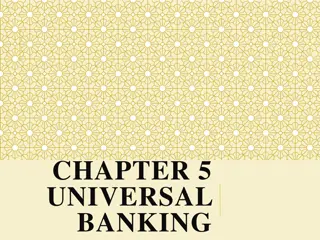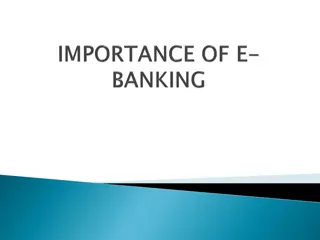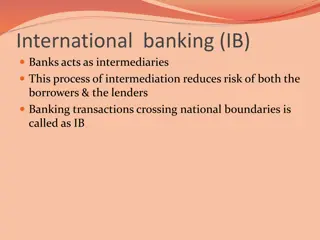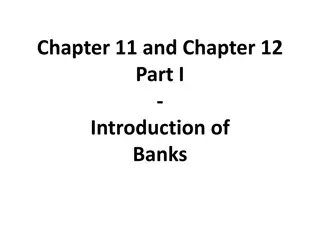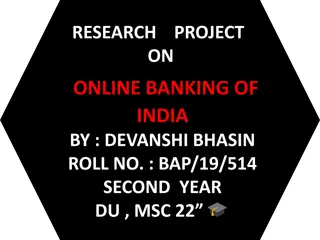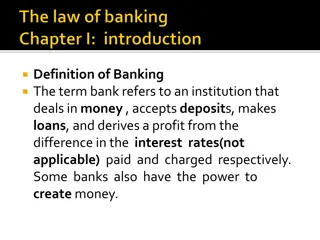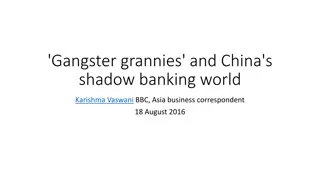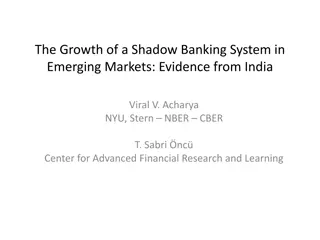Understanding the Role of Merchant Banking in Finance
Merchant banking is a combination of banking and consultancy services that assist in various financial activities like raising finance, business expansion, and stock exchange dealings. It provides expert advice on financial, marketing, and legal matters while facilitating capital formation and modernization of businesses. Merchant bankers act as intermediaries in the issue management process, matching capital seekers with investors and offering specialized services such as underwriting and portfolio management.
Download Presentation

Please find below an Image/Link to download the presentation.
The content on the website is provided AS IS for your information and personal use only. It may not be sold, licensed, or shared on other websites without obtaining consent from the author. Download presentation by click this link. If you encounter any issues during the download, it is possible that the publisher has removed the file from their server.
E N D
Presentation Transcript
Introduction to Merchant Banking
Meaning Of Merchant Banking Merchant Banking is a combination of Banking and Consultancy Services. Consultancy means to provide advice, guidance and services for a fee. It helps to raise finance. It helps to expand and modernize the business. It helps to review sick business units. It also helps companies to register, buy and sell shares at the stock exchange. It provides consultancy to its clients for financial, marketing, managerial and legal matters.
Definition Any person who is engaged in the business of issue management either by making arrangements regarding selling, buying or subscribing to the securities as managers, consultants, advisors or rendering corporate advisory service in relation to such issue management. The financial institutions providing specialist service which generally include the acceptance of bills of exchange, corporate finance, portfolio management, underwriting and other banking services.
Objectives of MB To assists in the capital formation in the economy. To assists in modernization and diversification of business units. To assists in mobilizing resources of the business enterprises. To assists in foreign exchange dealings within the ambit of relevant laws and regulations To promote the venture capital technology funds and provides services to them. To assists in project formation and development. To create secondary market for bills and facilitate discounting or rediscounting of bills. 1. 2. 3. 4. 5. 6. 7.
MB acts as a manager, consultant, advisor in the Issue Management process. 2. They are the financial intermediary that matches the entities that need capital and those that have capital for investment. 3. MB engages in the business of Issue Management. 4. MB services include the arrangement regarding selling, buying or subscribing to securities. 1.
5. MB is skill based activities and involves serving every financial need of the client. 6. The MBs charge fee and commission as their income. 7. They provide special and sophisticated services at a national and international level.
SEBI has classified Merchant Bankers into 4 categories on the basis of Capital Adequacy: Category I :- The capital adequacy requirement for category I, merchant bankers is that the net worth should not be less than 5 cr. The banker would be allowed for carrying on any activity of the Issue Management which will consist of preparation of prospectus & other information relating to the issue, determining financial structure, tie up of financiers, final allotment & refund of subscription. MB act as Advisor, Consultant, Manager, Underwriter & Portfolio Manager.
2. Category II The minimum capital adequacy requirement for category II, merchant banker is a net worth of 50 lakh. This merchant banker is allowed to act only as Advisor, Consultant, Co manager, Underwriter, & Portfolio Manager.
3. Category III The Minimum capital adequacy requirement for this category should be Rs. 20 lakh. The possible activities they can carry on are Underwriting, Advisor & Consultant to an issue.
4. Category IV There is no capital adequacy requirement specified for this category. Merchant banker is only allowed to act as Advisor, or Consultant to an issue.
The organisational set up of MB in India can be classified into four groups on the basis of linkages with parent activity. Bankers Base 2. Institutional Base 3. Brokers Base 4. Private Base 1.
Bankers Base This type of MB functions as a Subsidiary Institution or a division within the bank. The parent banks are either foreign bank operating in India or Indian Bank. Many Indian Banks are in the category of public bank or private bank. This type of MB helps the parent company to participate in the capital market as an intermediary. Foreign Players : Bank of America, Citibank etc Public Sector Players : Bank of Maharashtra, Punjab National Bank Private Sector Players : ICICI securities, Kotak Mahindra Capital Co Ltd.
Institutional Base MB functions as an independent unit or as subsidiary of various private or Govt financial institution. In India most of the financial institution function under public sector. Public Financial Institution : IFCI Financial Service Ltd., IDBI Capital Market services Ltd. Private Financial Institution : Reliance Securities Ltd., Tata Capital Markets Ltd
Broker Base Brokers are playing major role in different aspects by having qualified and professionally skilled groups in their business team. They are undertaking MB related operations also like, portfolio management services, issue management etc. Karvy Consultancy services Ltd. Motilal Oswal Investment Advisory Ltd. Religare Capital Market
Private Base These MB firm operate as sole proprietary, partnership, private ltd. These type were popular before the establishment of separate division of commercial banks. They provide skill based services to the clients. Finshare Mgt services Pioneer Invertcorp A.K. Capital Service Ltd
QUALITIES OF A MERCHANT BANKER
Merchant Banks Commercial Banks 1) Assist in raising capital in the form of 1) Provide funds in the form of term loan equity, preference shares, and syndicated and working capital. loan working capital instruments. 2) Advisor not financer. 2) Financing is the main business. 3) Do not accept chequable deposits. 3) Demand deposits are the key feature. 4) Mainly fees based business. 4) Mainly fund based business
Merchant Banks Commercial Banks 5) Being advisors, they are closer to the 5) Being lenders, they are more cautions, customers and get to know risks of the assess risks in lending proposal and transaction s properly. They work on cannot afford to be grossly relationship risks shields i.e. mitigation measures based and close to the customer. 6) Most of work they get is about 6) Commercial banks majority business management of equity issues in the is of terms lending and bank deposits. capacity of lead manager, underwriter, piercing of issue, book running, and liaisoning with SEBI.
Merchant Banks Commercial Banks 7) Merchant banks cater to the needs of 7) They cater to the needs of the corporate firms. common man. 8) MB cannot undertake banking 8) CB undertake merchant banking business business
Difference between Merchant Banking & Investment Banking
Parameter Merchant Bank Investment Bank Purpose Merchant banks exist primarily to provide business loans, facilitate international finance, and serve the various trading companies with underwriting roles. Investment banking exists to create capital for commercial and government entities. Funding The services of merchant banks are availed for commissions and interests. As such, they tend to be more expensive to come by comparatively. Those of the investment banking is however accessible via fees and funding on a case by case basis. They hence tend to be comparatively cheaper to come by. Clientele Merchant banks mainly deal with high net worth individuals and medium-sized corporate entities. Investment banks, however, deal with huge corporations as they have higher financial muscle power than the merchant banks.
A merchant bank facilitates the exchange of goods and services mainly by offering advisory services to the companies that deal with those trade. It also underwrites debts, processes payments and facilitates access to credit. Investment banks however aid companies in expanding their services mainly by scaling new heights. They arrange for extra capital and help companies in widening their scope of operations. Services Provided Sheer Size As we have already hinted, the merchant banks are smaller in size and financial muscle power. These two are mainly due to the fact that they handle fewer clients. Conversely, investment banks are larger in scope and financial muscle power due to their handling of many clients and the use of huge amounts of money.
Growth of new issue market 1. 2. Entry of foreign investors 3. RBI policies 4. Changing policy 5. Innovations in financial instruments 6. Corporate culture
SERVICES OF MERCHANT BANKERS
1. Corporate Counselling MB provide guidance to the clients on organisational goals, choice of product and market survey, forecasting a product, cost analysis, investment decisions, pricing methods, capital management, marketing strategies etc. The scope of corporate counselling is limited to giving suggestions and opinions to clients and help in taking actions to solve their problems.
2. Project Feasibility Study : It comprises preparation of project reports, deciding upon the pattern of financing to meet out the cost of the project and appraising the project report with financial institutions and banks. It also includes filling up of application forms with significant information for obtaining funds from financial institutions and obtaining government approvals etc.
3. Advice on capital structuring Based on the project appraisal & fund capacity of the promoters, merchant bankers prepare suitable capital structure. Firstly , optimal & achievable debt-equity mix is decided. Then within equity how much from promoters, how much by private placement and when & how much by public issue is decided.
4. Preparation of prospectus & liaisoning with SEBI As the co decides to go for public issue, merchant banker are appointed to prepare prospectus. It is as per the SEBI format. The activity includes lots of data collection from the corporate itself as the theme of prospectus is disclosures to the prospective IPO investors. The prospectus so prepared is submitted to SEBI. The merchant bankers hold dialogues with SEBI officers & comply with any suggestions, requirements from them. Prospectus is updated & resubmitted for final approval.
5. Loan Syndication Loan syndication refers to the services rendered by an organization in arranging & procuring credit from financial institutions, banks, other lending & investment cos. For financing the project or meeting working capital needs. The merchant banker involves it self in identification of sources from funds could be arranged, approaching these sources with requisite application & supporting documents & complying with all formalities involved in sanction & disbursal of loan.
6. Issue Management Issue management means management of issues which involves marketing of corporate securities such as equity shares, preference shares and debentures by offering to public. After taking action as per SEBI guidelines, the MB organizes a meeting with company representatives and advertising agents to finalize arrangements relating to date of opening and closing an issue, registration of prospectus, launching publicity campaign and fixing date for board meeting to approve and sign prospectus and pass the necessary resolutions.
7. Advice on mergers & acquisitions Merchant bankers scrutinize merger, acquisition & takeover proposal. Merchant bankers work on both the sides, acquirer as well as acquiree. Tasks include projection of post merger scenario, assessment of viability of merger. Decisions include share exchange ratio, nature of deal etc.
8. Underwriters to issues If subscription to the issue is less than full i.e. under subscription, then underwriters are responsible to subscribe to the gap between total applied capital & size of the issue. Maximum guarantee of the underwriter could be up to 10% of the total issue size. That means at least 90% of the issue must be subscribed to by prospective investors. Remaining 10% under subscription is filled by the underwriters. Incase issue subscription is less than 90%, then amount is refunded to applicants & issue stands cancelled. A separate licence is to be taken from SEBI for underwriting activity.
9. Venture Capital Funding an emerging high risk, hi tech project based purely on R & D efforts is called Venture Capital financing. The services of MB includes the provision of long term start up funds for high risk ventures promoted by unknown entrepreneurs which suffer from capital deficiencies but have a high profit potential.
10. Assistance in ADR/GDR and other international instruments. Many Indian corporate issue ADRs/GDRs in US & other global markets respectively. They have to deal with the local depository & merchant bankers in respective countries. The corporates at times lack in expertise to deal with them or they de not have adequate staff to coordinate entire process with these agencies Mostly these corporates appoint an Indian merchant banking firm to coordinate with foreign merchant bankers & depositories.
11. Miscellaneous Services MB also provides leasing, counselling to sick industrial units, distribution of financial product, asset management, investment research, joint ventures etc.
MB in India is governed by SEBI Regulations Act 1992. These are amended from time to time. It is mandatory for a MB to register with SEBI. 1. An application should be made to SEBI in Form A as per SEBI regulations. SEBI shall consider the application and on being satisfied issue a certificate of registration in Form B. The MB has to pay a sum of Rs 10 lakhs as registration fee. 2. The applicant should not carry on any business other then those connected with the securities market.
All applicants for MB should have qualification in finance, law or business management and applicant should have infrastructure like space, equipment, manpower etc. There are 4 categories of MB Category I, II, III and IV. The capital adequacy of each category is prescribed by SEBI : Category I Rs 5 crore Category II Rs 50 lakh Category III Rs 20 Lakh Category IV Nil 3. 4. 5.
7. MB should fulfill capital adequacy criteria as specified by SEBI from time to time. 8. SEBI has prescribed the code of conduct to MB and MB should perform his duties with highest standards of integrity and fairness in all his dealings. 9. MB has to maintain proper books of accounts and have to submit half yearly / annually reports to SEBI from time to time. 10. Every MB should appoint a compliance officer. 11. SEBI can suspend or cancel registration of MB anytime if they violate rules.









